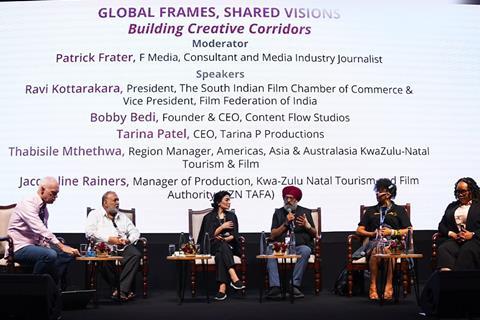
As Commonwealth countries and members of the BRICS alignment, India and South Africa have plenty in common at the diplomatic level. They have a significant historical overlap too, with Gandhi having lived in and been significantly influenced by his 21 years in Kwazulu Natal.
Contact and partnership between the two countries’ present day entertainment industries, however, has been on a back burner.
A panel discussion at Waves Film Bazaar in Goa aimed to increase communication and build towards more activity. Speakers included: Tarina Patel CEO of Tarina P Productions; Thabisile Mthethwa, regional manager – Americas, Asia & Australasia at the KwaZulu-Natal Tourism & Film Authority; Jacqueline Rainers, manager – production, KZN Tourism and Film Authority; Ravi Kottarakara, president – South Indian Film Chamber of Commerce; and Bobby Bedi, founder and CEO of Indian production firm Content Flow Studios.
While inter-government discussions about the establishment of a bilateral co-production treaty have been held intermittently for over a decade, these have not yet resulted in a formal agreement. Patel, who is preparing a production that she intends to shoot in both countries, said she believes that a deal will be struck within a year. (Subsequent, legislative approval and ratification typically add an additional year to the process.)
Meanwhile, the availability of film finance, which is one of the key conditions that make co-production treaties viable, is improving in both countries. South Africa offers a 25% production rebate system while India offers a 30% rebate against qualifying production expenditure, with an additional bonus of 5% for those productions with significant Indian content.
“We have an active incentive that we want Indian producers to know about,” said Rainers. “You have to work with our producers [to access it] because we fund our citizens in a fashion similar to how you operate [in India].”
She also pointed to other structures such as a one-stop permitting service, weather information, a locations database and even a unit within the KZNTA that operates as a production service company.
Kottarakara suggested that South Africa’s single-window clearance and shooting permit systems are not yet optimised, and that work permits and visa approvals can still be troublesome.
Rainers added that such criticism was welcome as it helps to improve South Africa’s services, but said her organisation has successfully helped other productions.
“We are currently working with Netflix at the moment,” she said. “They called us three days ago and said that they were running into administrative delays. They did not want to have cast sitting around waiting and we were able to get stuck in.”
The vastly experienced Bedi challenged the idea that coproductions are about money. “These things have been distorted by subsidies and talk of facilities and locations,” he said. “Actually, coproduction is about producing together and the most important part within that is the commonality of the stories. We’ve co-produced when there were no treaties. Money finds itself.”
Bedi said that stories can further be developed through workshops such as those that he has been involved connecting producers from India and Spain. When pressed, Bedi said that he would expect that such stories would largely originate from the South African side, “because there are Indians in South Africa who have been there for generations”.
“There’s so much symbiosis in terms of our value systems, the way we see family, the way we enjoy emotions, there’s almost no difference,” said Patel.
Rainers suggested that the comedy genre offers one of the strongest opportunities for India-South Africa film cooperation. “Comedy seems to work, comedy within the community, family and friends, with a note that historical dramas also work.”
Kottarakara agreed that humour is a common thread and said that informal production ventures are now taking place in the absence of a bilateral treaty. He cited the example of an upcoming Malayalam comedy-drama film in which a father and son journey between the two places. Likely to start production from April next year, it is expected to be in Kerala for 50% of its shoot and South Africa for 20%.
There was consensus that more communication needs to take place between industry members. While Bedi said that his labs initiative could be extended to South Africa, Rainers and Mthethwa encouraged Indian producers and filmmakers to visit the country in industry settings such as the Durban International Film Festival and Durban Film Market.
“Let’s have a conversation like this with industry players… so we can start moving a bit faster,” said Mthethwa. “Take the festival and market as an opportunity, bring the right producers, move them around the destination and see those locations, so that it becomes a holistic experience.”

























No comments yet